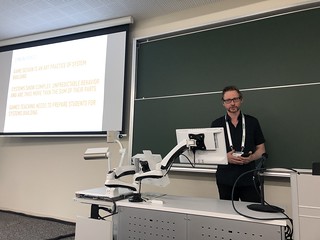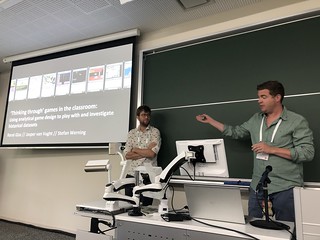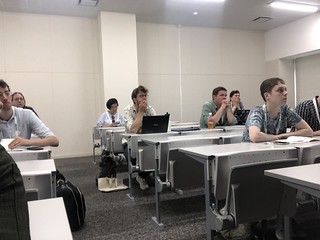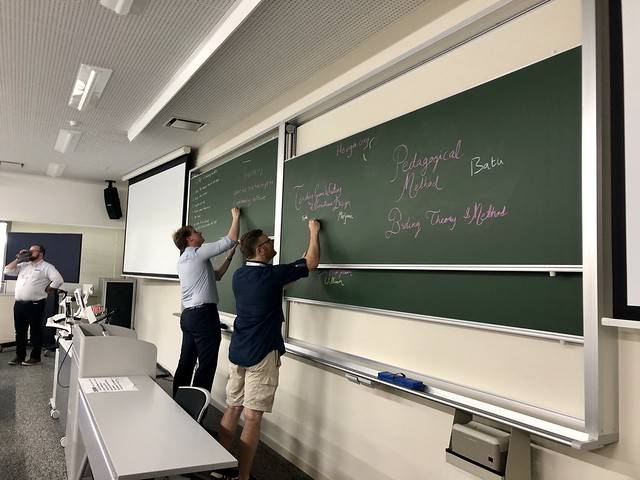The HEVGA workshop we organised on Teaching Games: Pedagogical Approaches at DiGRA 2019 Conference was a success!
Date: 6 August 2019
Place: Ritsumeikan University in Kyoto
In the morning, we had paper presentations, and the in afternoon we divided into discussion groups. Me, Mia Consalvo of Concordia, Jonathan Elmergreen of HEVGA, Clara Fernandez-Vara of New York University, William Huber of Abertay University, Hartmut Koenitz of HKU University of the Arts Utrecht, Petri Lankoski of Södertörn University, Adam Mayes of Uppsala University, and Andy Phelps of the American University, have put lot of effort into planning it, so it was gratifying that so many participated and contributed to the discussions.
In the morning session, we were 32 participants, and 7 papers were presented:
Clara Fernancez Vara and Jeff Watson also had papers accepted for the workshop, but unfortunately they couldn't make it to the workshop.
Here are a few pictures from the morning:






In the afternoon, we formed four groups for discussion. Two of the groups formed from topics that had emerged during the morning, and the two other groups used themes we had prepared as prior suggestions. The groups were:
• Teaching Game Writing and Narrative Design (emergent topic)
• Games in Societal Context (emergent topic)
• Teaching Game Research Methods
• Designing Education Programmes in the area of games

Below is a photo of our blackboard as it looked when we had finished forming groups around topics. The topics in the big pink circles became focusses for topics, and the names in the circles were the participants. Those names with a yellow circle around them were the appointed group leaders.

In the ending discussion, much focus was put on local culture: How is local culture represented in games, and how do we approach this as educators?
We hope to organise more workshops like this in the future :)
Links:

Date: 6 August 2019
Place: Ritsumeikan University in Kyoto
In the morning, we had paper presentations, and the in afternoon we divided into discussion groups. Me, Mia Consalvo of Concordia, Jonathan Elmergreen of HEVGA, Clara Fernandez-Vara of New York University, William Huber of Abertay University, Hartmut Koenitz of HKU University of the Arts Utrecht, Petri Lankoski of Södertörn University, Adam Mayes of Uppsala University, and Andy Phelps of the American University, have put lot of effort into planning it, so it was gratifying that so many participated and contributed to the discussions.
In the morning session, we were 32 participants, and 7 papers were presented:
- Seth Hudson. Phenomenological Research Approaches to Game Pedagogy
- Hartmut Koenitz and Mirjam Palosaari Eladhari. Teaching Game System Building as an Artistic Practice
- Hartmut Koenitz, Teun Dubbelman and Christian Roth. Ludonarrative in Game Design Education – Cornerstones of a Program
- Petri Lankoski and Mirjam Palosaari Eladhari. Constructive Alignment in Teaching Game Research in Game Development Bachelors Programme
- Mirjam Palosaari Eladhari. TOG: An Innovation Centric Approach to teaching Computational Expression and Game Design
- Christoffer Mitch Cerda. Defining “Filipino” Video Games: Teaching Filipino Identity and Culture for Video Game Development
- René Glas, Jasper van Vught and Stefan Werning. ‘Thinking through’ games in the classroom: Using analytical game design to play with and investigate historical datasets
Clara Fernancez Vara and Jeff Watson also had papers accepted for the workshop, but unfortunately they couldn't make it to the workshop.
Here are a few pictures from the morning:






In the afternoon, we formed four groups for discussion. Two of the groups formed from topics that had emerged during the morning, and the two other groups used themes we had prepared as prior suggestions. The groups were:
• Teaching Game Writing and Narrative Design (emergent topic)
• Games in Societal Context (emergent topic)
• Teaching Game Research Methods
• Designing Education Programmes in the area of games

Below is a photo of our blackboard as it looked when we had finished forming groups around topics. The topics in the big pink circles became focusses for topics, and the names in the circles were the participants. Those names with a yellow circle around them were the appointed group leaders.

In the ending discussion, much focus was put on local culture: How is local culture represented in games, and how do we approach this as educators?
We hope to organise more workshops like this in the future :)
Links:
- Slides for the workshop programme are available at SlideShare: Workshop on Teaching Games: Pedagogical Approaches at DIGRA2019
- The proceedings will be online at the workshop webpage: https://hevga.org/digracfp/
- A few more photos: https://flic.kr/s/aHsmGpaw6r
